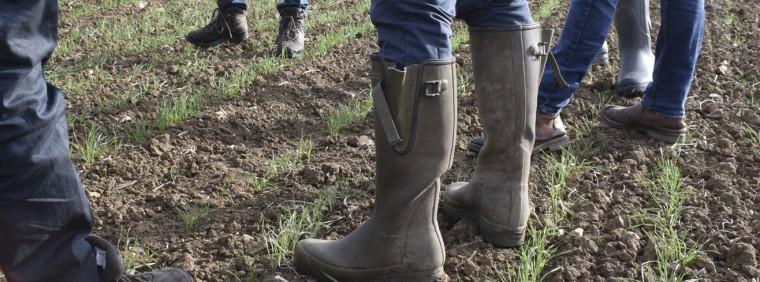The Innovative Farmers trial taking place on Bradwell Grove Estate in Oxfordshire has been testing how 17 conventional, heritage and some new European varieties perform on organic land. Currently, most commercial trials do not take place under organic conditions, with “untreated” varieties grown without fungicides but still using artificial fertilisers and herbicides.
The field lab, which is being led by farmers from an AHDB benchmarking group along with the Organic Research Centre and sponsored by the Agriculture and Horticulture Development Board (AHDB), found several varieties performed better than others in organic conditions.
In terms of yield, a European variety Mortimer performed particularly well, whereas Zyatt and Anapolis were both significantly lower yielding. Heritage wheat variety Maris Widgeon performed as well as commonly grown varieties like Skyfall and Revelation, both in terms of yield and protein levels.
Assessments included disease susceptibility, protein levels, yield and growth characteristics, which provide valuable insight to farmers on variety choice. All varieties will also be assessed at a mill for bread making potential.
Jerry Alford, arable advisor at Innovative Farmers, said: “The great thing about this field lab is that is has been completely driven by farmers who want to reduce the uncertainty of selecting organic wheat varieties. The Innovative Farmers network enables farmers to carry out research like this on their own farms, with support from scientists so that we have robust results that have been instigated by real, practical work on all different types of farm. The results have given us some great insight so far and as the trial continues next year it will be interesting to see how the varieties fare in different weather conditions, following the challenging year we’ve had this year.”
Charles Hunter Smart, manager of Bradwell Grove Estate, said: “It can be really challenging selecting the right wheat seeds for an organic farm as such little research has been recorded. Most research is carried out in non-organic conditions with the untreated controls only missing out on the chemical fungicides and growth regulations, leaving fertiliser and weed control the same as any other conventional crop – so it is a completely unclear picture for an organic farmer.
“This field lab has been really interesting as we have found significant differences in both yield and protein levels when these seeds are grown under organic conditions. But it’s important we have more trials on different soil types as on another soil you’ll get a different result, which is why I’m keen to help and provide insight on how they grow in our own Cotswold brash soils. Now we have the start of some scientific results that will hopefully help us to have confidence in the wheat varieties we are selecting.”
Key findings:
- Mortimer was highest yielding variety, although at a higher rate of seeds planted per hectare than the regular trial. Experimental variety AWC13 was also drilled at higher seed rates – these both yielded better than low rate plots, possibly down to the dry year.
- At standard seed rates, Gleam, Graham and Crispin produced the highest combined yields of grain and protein
- Zyatt and Anapolis were the lowest for harvested protein yield. (Standard seed rate.)
- There was little disease pressure with all varieties showing low levels of Septoria. Crusoe had some Brown Rust, and Skyfall was the only variety exhibiting any Yellow Rust.
Figure 1: Graph showing grain Yield of the tested varieties – bars indicate the mean, error bars indicate the standard error of the means:

Grain protein is important for wheat, particularly milling wheat but also as an ingredient in animal feedstuffs, however protein yield is always at expense of grain yield. The trial has looked at protein percentages but also looked at which varieties produced higher yields of harvested protein and see whether any produce outside of the normal rules.
Figure 2: Graph showing protein yield against grain yield

A similar trial is being carried out commercially on organic land by Cope Seeds & Pearce’s Seeds, and those results will also be compared to those from the Innovative Farmers field lab.
The field lab will be continuing next year to carry out further investigations and confirm the year one findings. There will be a further replicated variety trial and small areas of selected varieties will also be grown on other farms at a field level using farm machinery to look at more regional variety effects. The plan is to expand the group by getting more farmers involved by looking at spring wheat and Barley varieties.
Anyone who is interested can get in touch by contacting info@innovativefarmers.org and for more information visit www.innovativefarmers.org




